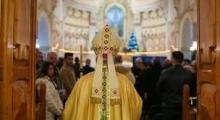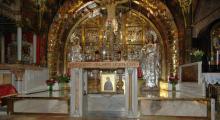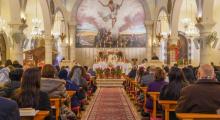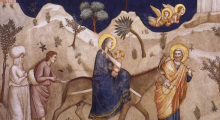Issued by the Catholic Center for Studies and Media - Jordan. Editor-in-chief Fr. Rif'at Bader - موقع أبونا abouna.org
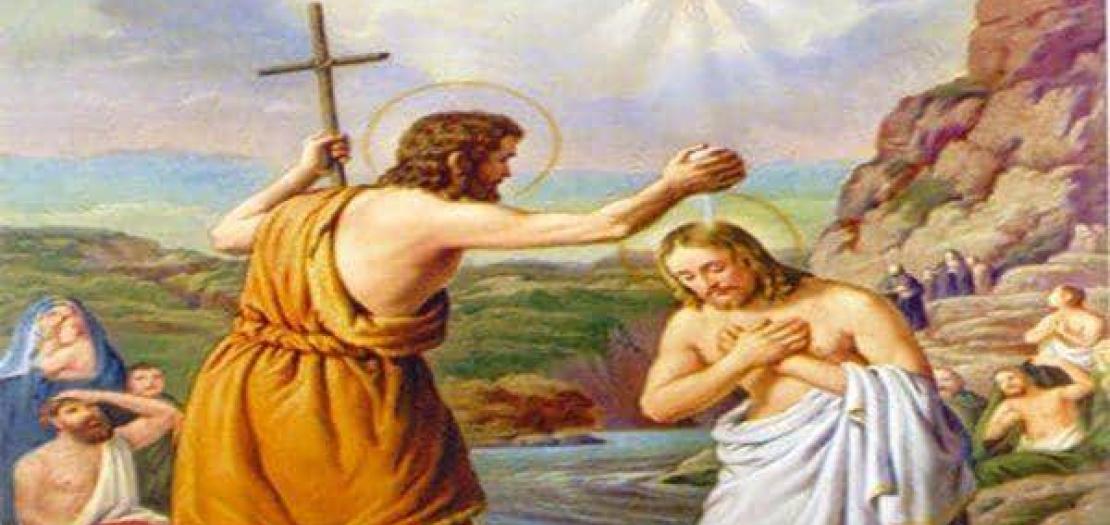
Following is the text of the meditation by Latin Patriarch of Jerusalem His Beatitude Pierbattista Pizzaballa for the second Sunday in Ordinary Time, year A, January 15, 2023:
Last Sunday, we celebrated the feast of the Baptism of Jesus.
Today we listen to the account of the Baptism done by the Baptist himself, in the Gospel of John. (John 1:29-34)
The Gospel according to John, unlike the Synoptics, does not report the account of Jesus’ baptism in the Jordan. Instead, it brings back the memory that the Baptist makes of this event.
This is the first distinction on which we will dwell. For John the Baptist, the event of the baptism was deeply embedded in memory, and it had been this memory that, gradually, revealed to him the mystery of Jesus, the Christ, the Lamb of God.
Before this event, John cannot say that he knows the Lord, so he states: “I do not know him” (John 1:31). But after the Baptism, when he sees him coming towards him, he immediately recognizes him as the One who was always awaited, the One who was before (“A man is coming who ranks ahead of me because he existed before me” (John 1:30) and who has now become flesh, has entered time, the history of mankind.
The memory of the Baptism makes John understand two aspects of Jesus’ identity.
The first, fundamental, is that the man baptized in the Jordan is the Lamb of God, the One who takes away the sin of the world. (John 1:29)
The reference is to the Jewish Paschal feast when lambs were sacrificed in memory of the night of the Exodus when God passed over the houses of Egypt and exterminated all those who did not have the blood of the lamb on the doorposts of their home. (Exodus 12:7-13)
But the Baptist, here, is concerned to immediately point out that the specific and unique mission of this new Lamb it that of taking on himself the sin of the world.
Dealing with the sin of the world is not something that lies in human possibilities and capability: sin is the great problem of man and it is not in his power to free himself from it alone. Indeed, right there is the problem, man’s attempt to get by with his power, alone, without God, without the Father.
Therefore, this task is entrusted to the Lamb of God: to liberate man from his sin, from his solitude. How He will do it is already inscribed in the picture of the Lamb, of the One who sacrifices life, who gives himself: that will be the powerful antidote to sin that entered the circle of man’s life, that will heal its source forever.
The second affirmation made by the Baptist is: “This man is the Son of God” (John 1:34): if He can deal with sin, if He can free man from evil, then This Man is Son of God. An ordinary man could not do it. Jesus can do it, as Son of God, but also as son of man. He is a man, in flesh and bone, that John can see (John 1:29) with his eyes.
But He is also a man on whom, John sees (John 1:33,34) the Holy Spirit descending and remaining, namely the very life of God, the communion between the Father and the Son that is given to man.
Only in so far as He is filled with the Spirit can Jesus face the great battle of sin, of death, and he will do it not keeping anything for himself, much less the Spirit that John sees descending on Him in the Jordan.
After His resurrection, the first thing that Jesus will do will be to give the Spirit, to pass on to His disciples, His Church. (John 20:22)
The antidote to sin will be precisely this, the Spirit, that is love.
And there will be need of a God who makes himself a Lamb so that this Spirit can be communicated to all the other sons of God, to those whom God loved and who have welcomed Him. (John1:12)


